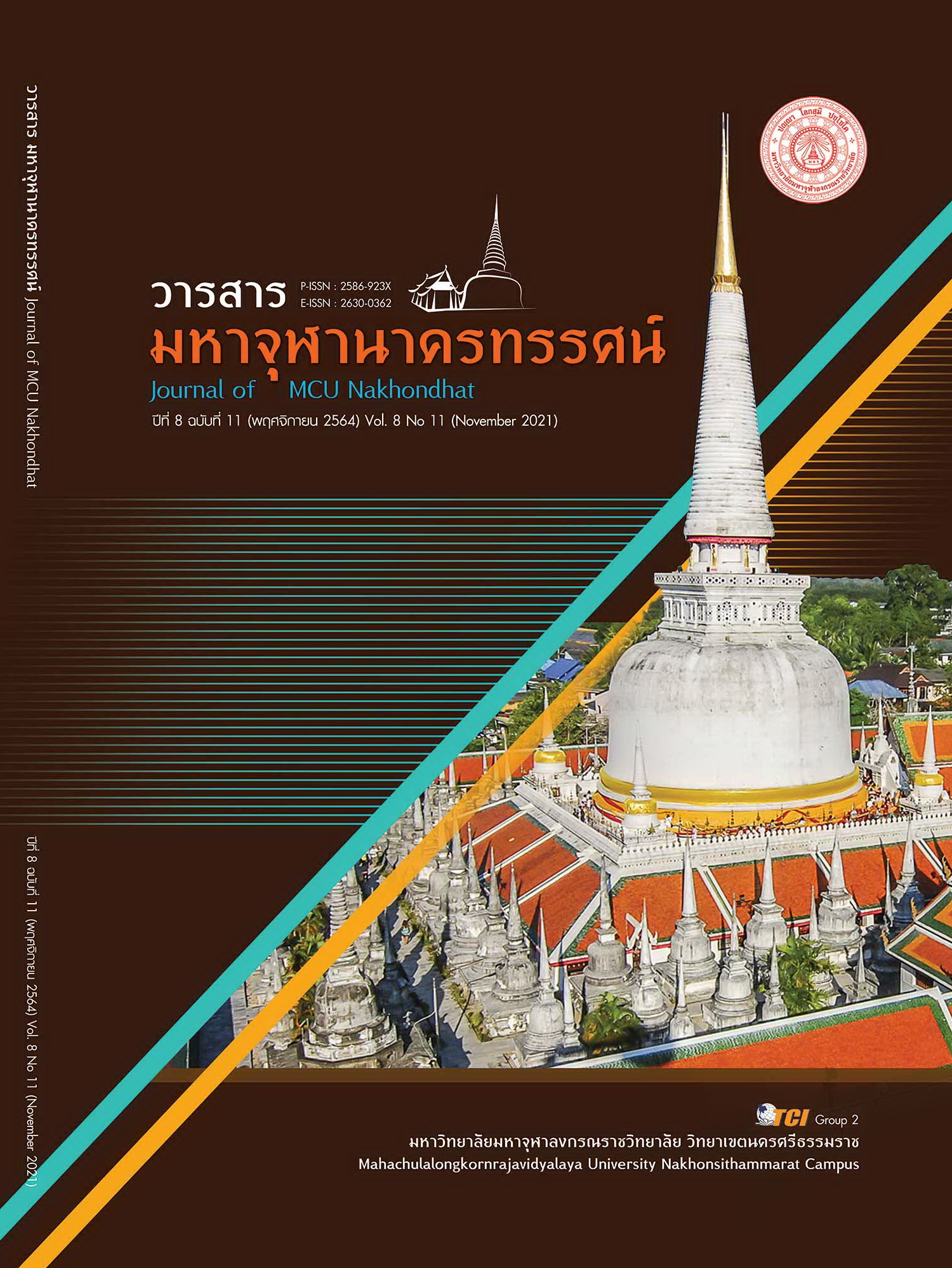GUIDELINES FOR THE DEVELOPMENT OF PARTICIPATION IN ACADEMIC ADMINISTRATION OF THE CENTER FOR EDUCATIONAL QUALITY DEVELOPMENT PHIBUN MANGSAHAN DISTRICT UNDER THE OFFICE OF UBON RATCHATHANI PRIMARY EDUCATIONAL SERVICE AREA 3
Main Article Content
Abstract
This article aims to 1) study the current situation. desirable condition and necessary needs Participation in academic administration of Phibun Mangsahan District Educational Quality Development Center under the Office of Ubon Ratchathani Primary Educational Service Area 3.2) Develop approaches to participation in the academic administration of the Center for Educational Quality Improvement Phibun Mangsahan District under the Office of Ubon Ratchathani Primary Educational Service Area 3. The sample consisted of 266 administrators and teachers were obtained by group randomization. The tools were questionnaire, interview form, record form, assessment form. The statistics used in the research were percentage, mean, standard deviation and PNI need index. The results of the research were as follows: 1. Current conditions, desirable conditions of participation in academic administration of the Center for Educational Quality Development Phibun Mangsahan District under the Office of Ubon Ratchathani Primary Educational Service Area 3, the overall current condition is moderate. and overall desirable conditions were at the highest level. 2. Development of guidelines for participation in academic administration of the Center for Educational Quality Improvement Phibun Mangsahan District under the Office of Ubon Ratchathani Primary Educational Service Area 3 consists of 5 components as follows : 1) Principles 2) Objectives 3) Operating Mechanisms 4) Methods There are 5 characteristics 4.1) Participation in thinking and decision making 4.2) Participation in planning 4.3) Participation in investment 4.4) Participation in monitoring and evaluation participation 4.5) Participation in benefits and impacts 5) Conditions for success The results of the assessment of the appropriateness and feasibility of the approach revealed that the overall appropriateness of the approach was at the highest level and the possibility was at the highest level.
Article Details
References
คงคา วงค์อามาตย์. (2559). การพัฒนาแนวทางการบริหารงานวิชาการแบบมีส่วนร่วมสําหรับสถานศึกษาขนาดเล็ก สังกัดสํานักงานเขตพื้นที่การศึกษาประถมศึกษาร้อยเอ็ด เขต 1. ใน วิทยานิพนธ์การศึกษามหาบัณฑิต สาขาการบริหารการศึกษา. มหาวิทยาลัยมหาสารคาม.
จันทร์ธิวา โสภา. (2560). การพัฒนาแนวทางการมีส่วนร่วมของชุมชนในการจัดการศึกษาของสถานศึกษาสังกัดสำนักงานเขตพื้นที่การศึกษาประถมศึกษาสกลนคร เขต 3. ใน วิทยานิพนธ์การศึกษามหาบัณฑิต สาขาการบริหารการศึกษา. มหาวิทยาลัยมหาสารคาม.
ประภาศิริ คูนาคำ และคณะ. (2559). รูปแบบการบริหารงานวิชาการแบบมีส่วนร่วมในสถานศึกษา สังกัดสำนักงานเขตพื้นที่การศึกษามัธยมศึกษา เขต 24. ใน วิทยานิพนธ์การศึกษามหาบัณฑิต สาขาการบริหารการศึกษา. มหาวิทยาลัยมหาสารคาม.
รัตนาภรณ์ อนิวรรตน์วงศ์. (2560). การพัฒนาแนวทางการมีส่วนร่วมของคณะกรรมการสถานศึกษาขั้นพื้นฐานในการจัด การศึกษาด้านวิชาการ สำหรับโรงเรียนมัธยมศึกษา สังกัดองค์การบริหารส่วนจังหวัดนครราชสีมา. ใน วิทยานิพนธ์การศึกษามหาบัณฑิต สาขาการบริหารการศึกษา. มหาวิทยาลัยมหาสารคาม.
วิจารณ์ พานิช. (2555). วิถีสร้างการเรียนรู้เพื่อศิษย์ในศตวรรษที่ 21. กรุงเทพมหานคร: มูลนิธิสดศรี-สฤษดิ์วงศ์.
สำนักงานเขตพื้นที่การศึกษาประถมศึกษาอุบลราชธานี เขต 3. (2561). รายงานผลการปฏิบัติงานประจำปี 2561. อุบลราชธานี: สำนักงานเขตพื้นที่การศึกษาประถมศึกษาอุบลราชธานี.
สำนักงานคณะกรรมการการศึกษาแห่งชาติ. (2543). รายงานการเสวนาทางวิชาการ มิติใหม่ของการประเมินผล:การเรียนที่เน้นผู้เรียนเป็นศูนย์กลาง. กรุงเทพมหานคร: สำนักงานคณะกรรมการการศึกษาแห่งชาติ.
หน่วยศึกษานิเทศก์ สำนักการศึกษา. (2551). คู่มือการบริหารจัดการในโรงเรียน สังกัดกรุงเทพมหานคร การบริหารงานวิชาการ. กรุงเทพมหานคร: สำนักการศึกษา.
Deming, E. W. (1990). Out of the Crisis. USA. Massachusetts: The Massachusetts Instittus of Technology Center for A dvanced Engineering study.
Everard, B. & Morris, G. (1990). Effective School Management. London: Paul Chapman.


